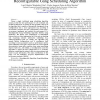Free Online Productivity Tools
i2Speak
i2Symbol
i2OCR
iTex2Img
iWeb2Print
iWeb2Shot
i2Type
iPdf2Split
iPdf2Merge
i2Bopomofo
i2Arabic
i2Style
i2Image
i2PDF
iLatex2Rtf
Sci2ools
101
click to vote
JSSPP
2004
Springer
2004
Springer
Reconfigurable Gang Scheduling Algorithm
Using a single traditional gang scheduling algorithm cannot provide the best performance for all workloads and parallel architectures. A solution for this problem is the use of an algorithm that is capable of dynamically changing its form (configuration) into a more appropriate one, according to environment variations and user requirements. In this paper, we propose, implement and analyze the performance of a Reconfigurable Gang Scheduling Algorithm (RGSA) using simulation. The RGSA uses combinations of independent features that are often implemented in GSAs such as: packing and re-packing schemes (alternative scheduling etc.), multiprogramming levels etc. Ideally, the algorithm may assume infinite configurations and it reconfigures itself according to entry parameters such as: performance metrics (mean utilization, mean jobs response time etc.) and workload characteristics (mean jobs execution time, mean parallelism degree of jobs etc.). Also ideally, a reconfiguration causes the ...
Related Content
| Added | 02 Jul 2010 |
| Updated | 02 Jul 2010 |
| Type | Conference |
| Year | 2004 |
| Where | JSSPP |
| Authors | Luís Fabrício Wanderley Góes, Carlos Augusto Paiva da Silva Martins |
Comments (0)

